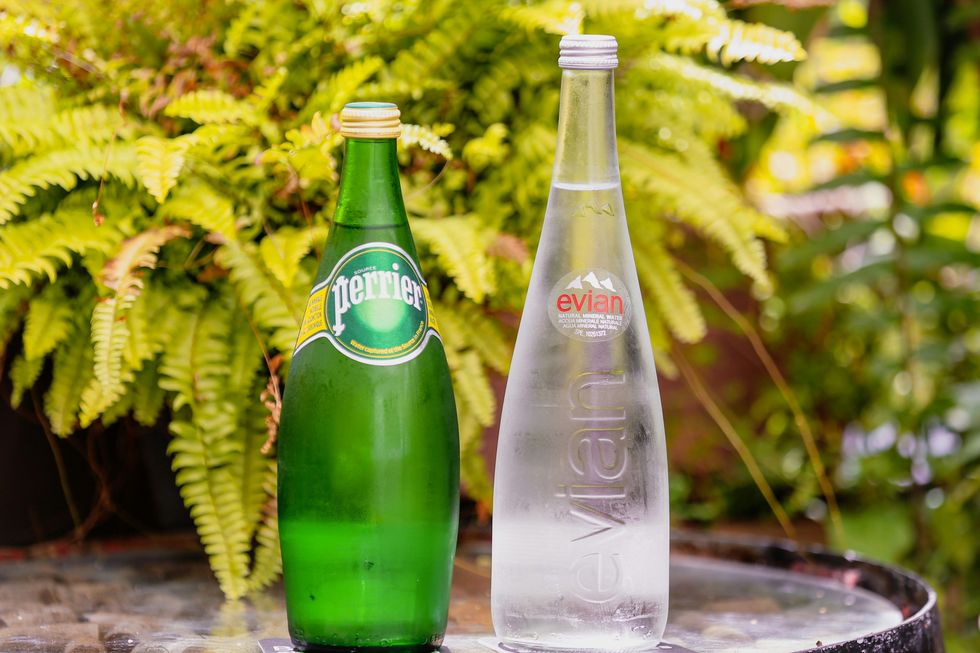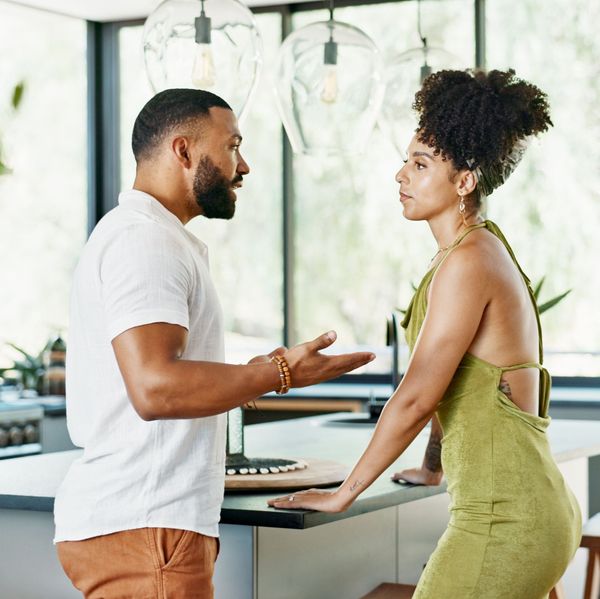The Relationships In Your Life That Are Desperately In Need Of Boundaries

Boundaries. Whew. I can't even begin to count how many life dramas that I personally could've avoided if I had simply known how to set the proper boundaries; not once the ish had already hit the fan, but from the very beginning. Everyone's story is different, but I think the reason why I struggled so much with it is because I'm a childhood abuse survivor. Abuse is all about violating and disrespecting someone's boundaries. And so, as you're in the process of trying to heal from that, it can be a lifelong journey, learning how to set boundaries and make good and damn well sure that people honor them.
It took me getting into my 30s and learning how to set some boundaries in the form of self-control within myself (which is a part of what my abstinence path has been about) that I learned how to establish boundaries with others. I read books (Boundaries is one that's a must-have). I paid attention to the wisdom of people like author and speaker Brene Brown ("Daring to set boundaries is about having the courage to love ourselves, even when we risk disappointing others" is a great quote of hers). I spent time alone so that I could figure out what I needed so that I could build my relationships around that. I've "updated" my boundaries when necessary too.
And what I've learned from all of this is there are certain relationships where boundaries are an absolute must. The ones that I want to expound on today are the following seven.
Boundaries with Your Parents
Parents. Boy oh boy. Although I am not a parent myself, I am at the age where a lot of my "love" nieces and nephews are in their 20s. Just this past weekend, I saw one of them and, while I try to be intentional about treating children of any age like "little individuals", I had to remind myself that I have to come at her a different way and respect whatever it is she has going on…differently. Why? Because she's an adult now. She has her own life. All I can do is offer insight, but she's got the full right and freedom to do whatever it is that she wants to do.
It's kind of baffling, how a lot of actual parents of actual adult children don't seem to adhere to this same mindset. It's like they think that we're "grown enough" to live on our own but not grown enough to make decisions they don't agree with or like or, that it is totally ridiculous of us to tell them "no" sometimes.
I will say this—it's an epidemic, how poorly boundaries were taught in a lot of households that some of us confuse overbearing parents with toxic ones (you can read my take on toxic relatives here). On some levels, I do get how, after birthing someone and raising them for 18 years, allowing them to live their own life can be a hard pill to swallow. Still, it must be done. And so, if you are trying to figure out how to establish boundaries with your parents, check out the article "Do Not Obey Your Parents" that features a great role play example of how to say "no", no matter how much pressure or emotional manipulation your parents try and put onto you. Then check out "10 Signs You Might Have Unhealthy Boundaries With Your Mom". You might be surprised by how much you'll be able to relate to that one.
Healthy parents know that their job was to help you to become a mature and responsible adult. Once you are at that point, a part of what comes with adulthood is doing what's best for you, regardless of if they like, understand or agree. You are their child yes, but you are no longer a child.
Do not feel guilty in the least for conveying that—in your words as well as your actions. (If you are a parent of adult children, all of what I said still applies; just in the reverse.)
Boundaries with Your Spouse
Out of all of the boundaries that I'm going to set out to tackle today, I think that the most difficult to maneuver through is setting some appropriate ones with your spouse. After all, they are so close to you that, at least most folks, share a bed, bills and a last name. But marriage is not to be a dictatorship in either direction because no man wants to have sex with his mother and no woman wants to have sex with her dad. That's why it has to be a daily conscious decision to not act like your spouse's parent. Instead, treat your union like the most sacred of partnerships.
Being that boundaries are limits, as far as limits go, the first thing I would say is that your marriage vows (at least traditional ones) address boundaries of loyalty and fidelity. Aside from that, there needs to be a mutual understanding when it comes to expectations. There needs to be no abuse, of any kind. But it also needs to go deeper than that. Married people should agree to not speak negatively of one another to other people. They need to not withhold sex as a way to get what they want or to "teach a lesson". They need to respect one another's view and needs. They need to avoid going below the belt during arguments. They also need to give one another some space.
I could go on and on, but this is an article and not a book on the topic. Luckily, there is a great book that addresses all of this and more. If you are married or are contemplating getting married, Boundaries in Marriage (by Dr. John Townsend and Dr. Henry Cloud) is definitely worth adding to your own personal library.
Boundaries with Your Significant Other
The reason why this gets its own section is because far too many of us make the grave mistake of treating someone we're dating as if they are already our spouse when they absolutely are not (check out "Why You're Always The One Who Prepares A Man For His Wife" sometime). And because they aren't, it is perfectly fine—encouraged even—to get out of anything that no longer serves you well. It doesn't have to be about abuse, them seeing other people without your knowledge or them taking you for granted. It can be as simple as you are dating to see what you want and don't want and, as you discover what that is, you are willing to release who you're with in order to get to the man who complements you best…and most.
I say it as often as I can because it's the truth. Your taxes say that you're single until you are legally married. Not until you've been dating someone for a long time or even until you are engaged. So, no matter how "into someone" you may be, it's OK to have firm limits and to end the relationship, for no deeper reason than you're single and you want to. It's one of the joys of singlehood. Embrace it. Unapologetically so.
Boundaries with Your Friends
Friends—good friends, that is—are one of God's greatest blessings. Hands down. And, to tell you the truth, if you've got healthy friends, this section isn't really necessary to read. I say that because it's been my personal experience and observation that the right kind of friends will honor your boundaries as you do the same. But if you've been on an emotional roller coaster ride in some of your friendships for so long that you don't even know what kind of limits to set, here are a few that you most definitely should. Express your expectations. Never tolerate disloyalty or disrespect. Do not let them monopolize your time, space or resources. Make sure they know that their opinion is not the gospel and they are your friend, not your parent. Pay attention to any behaviors that look like narcissism, always playing the victim role in order to get their way and/or being an emotional vampire. Take an issue with them gossiping about you or breaking confidentiality. Look out for jealous friends (a total oxymoron) and opportunists. Oh, and if they can't forgive but always want their mess and mistakes to be excused? That's another huge red flag.
Again, a good friend already knows all of this, but if you're constantly getting your feelings hurt or even your heart broken by a friend, chances are, it's because either no boundaries are in place or, they keep disrespecting them—and you keep allowing it.
Boundaries with Your “Enemies”
It might seem strange to have a section on enemies, but just hear me out for a sec. If you respect Scripture, even a little bit, and you live on this planet long enough, certain verses start to make more and more sense to you. Take "love your enemies" (Matthew 5:43-48), for example. Love them? If you could love them, y'all wouldn't be enemies, right? Oh, and for the record, enemies aren't just folks that you have knockout-fallouts with. By definition, an enemy may be someone who you choose to distance yourself from because they bring harm into your space, on some sort of level. You don't "hate" them; they just aren't as good for or to you as you know you deserve.
Anyway, it's a good idea to set boundaries with these kinds of people, just so that there can be peace in the midst of it all. Try and keep whatever your issues are with them private (mutually so). Avoid that cryptic-and-somewhat-silly passive aggressive banter that some people do on social media (mutually so). Whatever was shared between the two of you when you weren't enemies, it's important that you both honor that confidentiality. Should you see one another, no one has to sit in the other's lap, but do try and be cordial (and concise).
It takes quite a bit of self-awareness and personal maturity to realize that just because someone may be your enemy, you don't have to constantly be at war. But if you're able to set limits and honor them between one another, you'll be amazed by how at peace the two of you can be. Even if you're not exactly friends (or friends anymore).
Boundaries at Work
As I was in the process of writing this, I skimmed this write-up on Vice's site—"The Backlash to the Popeyes Chicken Sandwich Is Finally Here". It made me think about all of the articles I've read about how employees are working ridiculous hours with no breaks or bumps in pay. Yes, I've had the sandwich (in Durham; can't seem to get a hold of one in Nashville) and yes, it's good. Really good. But I feel a little guilty eating more of them if it comes at the expense of folks being overworked, underpaid and totally miserable (several employees have expressed those exact sentiments to me).
Thinking about what so many Popeyes employees have been going through made me also think about some conversations I've had with some of my friends about the stress and drama that they go through at their job.
A lot of it is due to a lack of boundaries. You know—constantly doing other people's work; always doing what doesn't fit their job description; doing work that they don't get paid for; enduring their employer and/or employees talking to them any ole' kind of way; being expected to honor the employee handbook when everyone around them doesn't; being called in on off days…the list goes on and on.
If this is something you can totally relate to and it's got you on the brink of straight-up snappin', when you get home tonight, have a glass of wine and read "6 Things You Don't Owe Your Boss". For now, if you just want the list, it's this—your health, family, sanity, identity, contacts and integrity. Any workplace that challenges this is a place you need to leave—quick, fast and in a super-duper hurry!
Boundaries with Your Church
If you've ever caught an episode of Larry Reid Live, you know that he is…something else. When it comes to the Church and some of the totally toxic things that transpire within it, he holds not one thing back. Some folks find him insightfully amusing while others, well, absolutely do not. But if there is one thing that I think every church-going person should watch, it's his breakdown of the Jezebel Spirit and how it functions in the Church. Then, after watching that, get free some mo' by reading "Jesus Set Boundaries".
Let's end this article with this point as it relates to where you may attend on Sabbath or Sunday. If the leadership pressures you to give outside of tithing (especially to the point that you can't pay your own bills); if they expect you to be there at the drop of a dime, regardless of what you've personally got going on (whether you're married or single); if you feel manipulated into doing things; if they act like what is going on inside of the church walls is more important than what is transpiring within the four walls of your own home; if they think their vision deserves more attention than your own; if they are never open to correction or rebuke (I Corinthians 5:12 speaks of church folks needing to be more concerned with what's going on inside than outside anyway) and/or if you feel taken for granted or mistreated and, when it's brought to the leadership's attention, it is not promptly addressed—these are just some examples of your boundaries being violated…yes, at your very own church. And violated boundaries, including at a place of worship, should not be overlooked.
A wise person once said, "If someone throws a fit because you set boundaries, it's just more evidence that boundaries are needed." That said, don't you, for one moment ever, feel guilty about setting a boundary. Be clear. Be firm. Be kind. But yes, set them—for the sake of your health, mental sanity and overall quality of life. Amen? Hallelujah indeed.
Want more stories like this? Sign up for our newsletter here and check out the related reads below:
I'm Good Luv, Enjoy: How Saying 'No' Keeps Your Life Balance In Check
Unhealthy Workplace Stresses You Need To Break Free From
Feature image by Shutterstock
- Revamping Your Boundaries: What Saturn Retrograde Can Teach ... ›
- Does Your Life Need Boundaries? Signs You Need Healthier ... ›
- Family & Friends Don't Always Know What's Best - xoNecole: Women's Interest, Love, Wellness, Beauty ›
- 3 Things I've Learned About Making Friends As An Adult - xoNecole: Women's Interest, Love, Wellness, Beauty ›
- How I Learned To Create Boundaries With My Toxic Parent - xoNecole: Women's Interest, Love, Wellness, Beauty ›
- Someone Treats You Like A Child - xoNecole: Women's Interest, Love, Wellness, Beauty ›
- Saturn Retrograde Zodiac Signs - xoNecole: Women's Interest, Love, Wellness, Beauty ›
- 8 Different Types Of Relationships - xoNecole: Women's Interest, Love, Wellness, Beauty ›
- I Love Her But I Don't Like Her Anymore - xoNecole: Women's Interest, Love, Wellness, Beauty ›
- How To Set Boundaries With Yourself - xoNecole: Women's Interest, Love, Wellness, Beauty ›
- How Boundaries Impact Every Area of Your Life and What To Do If ... ›
- A Life of Negotiating Boundaries - Personal Growth - Medium ›
- The Guide to Strong Relationship Boundaries | Mark Manson ›
- The No BS Guide to Setting Healthy Boundaries in Real Life ›
- Drawing Boundaries in our Relationships | Cru ›
- 10 Signs You Might Have Unhealthy Boundaries With Your Mom ... ›
- Why Healthy Relationships Always Have Boundaries & How to Set ... ›
- 5 Reasons Why You Need Boundaries in Your Relationships and Life ›
This Is How To Keep 'Holiday Season Stress' From Infecting Your Relationship
Hmph. Maybe it’s just me, but it seems like there is something really weird happening in the fall season air (because winter doesn’t officially begin until December 21) that cuddle season is in full swing while break-up season is as well. In fact, did you know that break-ups are so popular during the holiday season that December 11 is deemed Break-Up Day?
The reasons why relationships shift around this time vary; however, I did both roll my eyes and chuckle when I read that a very popular one is because it’s an easy way to get out of getting one’s significant other a Christmas present. SMDH.
Anyway, I personally think that the less shallow folks out here may contemplate calling things “quits” or they at least distance themselves a bit from their partner (and what I’m referring to is serious relationships) due to all of the stress and strain that oftentimes comes with the holidays whether it be financial, familial, due to their tight schedules or something else.
Listen, I would hate for you and your man to miss the fun and happiness of experiencing this time of year, all because you are so overwhelmed or irritated that you can’t really enjoy it. That’s why I have a few practical tips for how to avoid allowing the typical holiday season stress from INFECTING your relationship.
Manage Your Expectations
 Giphy
GiphyUnmanaged expectations. If there is a main reason why the holiday season tends to be so stress-filled for so many people, I’d bet good money that this is the cause. And when you’re in a long-term relationship, expectations can manifest themselves in all sorts of cryptic and/or unexpected ways. You might have relatives who assume that you are going to be with them for Thanksgiving or Christmas when you have other plans in mind. You might be thinking that you are going to spend one amount for presents while your man is thinking something totally different. When it comes to scheduling, your signals may be crossed.
And you know what? To all of these scenarios, this is where clear and consistent communication come in. Don’t assume anything. Don’t dictate anything either. From now until New Year’s, mutually decide to check in once a week, just to make sure that you are both on the same page as it relates to the holidays and what you both are thinking will come along with it. The less blindsided you both feel, the less stressed out you will be. Trust me on this.
Set (and Keep) a Budget
 Giphy
GiphyOkay, so I read that last year, 36 percent of Americans incurred some type of holiday-related debt. Hmph. Last year, there was still some sense of normalcy in this country, chile, so I can only imagine what finances are gonna look like over the next several weeks. That said, since I don’t know a lot of people who don’t find being broke stressful, make sure that you and your bae set a budget and then stick to it this year — no ifs, ands or buts.
Because really, y’all — it doesn’t make sense to deplete savings and/or max out credit cards for a few days of giggles only to be damn near losing your mind because you don’t know how to make ends meet come Dr. Martin Luther King, Jr. Day.
And by the way, this tip doesn’t just speak to things like food and gifts; I also mean travel. If it doesn’t make a ton of sense (or cents) to be all over the place this year — DON’T BE.
Keep Matthew 5:37 at the Forefront
 Giphy
GiphyIf off the top of your head, you don’t know what Matthew 5:37 says, no worries, here ya go: “But let your ‘Yes’ be ‘Yes,’ and your ‘No,’ ‘No.’ For whatever is more than these is from the evil one.” That verse right there? Oh, it’s a boundaries lifesaver! I say that because do you see “maybe” or “I’ll think about it” in there? Nope. LOL. It says that you should tell people “yes” or “no” and leave it at that — and that complements Anne Lamott’s quote, “’No’ is a complete sentence” impeccably well. Yeah, you’ve got to remember that anything beyond a yes or no to a request is privileged information; you don’t owe anyone details or an explanation.
Besides, if you are really honest with yourself, when someone asks you something and you give a “Umm, let me think about it” kind of reply, more times than not, you already know what your answer is going to be — so why not let you both off of the hook? Give your response. Commit to that. And let everyone (including yourself) get on with their lives and schedules.
I promise you that when it comes to those holiday parties, you are pissing more folks off by not RSVP’ing or doing so and not showing up than just saying, “Thank you but not this year” off the rip.
Remember That Your Personal Space Is Privilege Not a Right
 Giphy
GiphyA friend of mine recently bought a new house and invited me over to come see it. He’s a single man with no children, so as I was taking in all of the space that he had, especially as I walked through his finished basement, I joked about relatives coming to live with him. “Hell no” and “absolutely not” were pretty much his immediate responses as he went on to say that some folks even had the nerve to be offended when he told them that he had no intentions on taking DNA in.
Ain’t it wild how people think that your stuff is their right? And yes, that brings me to my next point. Your home is your sanctuary space. If you want to host folks this year — cool. If not, ALSO COOL. Please don’t let folks (family included) guilt you into how they want you to act or even into what they would do if the shoe was on the other foot. You are not them — and as one of my favorite quotes states, “If two people were exactly alike, one of them would be unnecessary.” (A man by the name Larry Dixon said that.)
Hell, my friends? They know that I am good for sending them random things that they need or even want all throughout the year. Coming over to hang out at my pace, though. Uh-uh. Chalk it up to being a card-carrying member of the ambivert club yet I like keeping my living space personal — and I sleep like a baby, each and every night, for feeling that way.
Always remember that your space, your time, your resources, your energy and shoot, yourself period (including your relationship), are all things that are your own. You get to choose how, when and why you want to share them. The holiday season is certainly no exception.
Cultivate Some “You Two Only” Traditions
 Giphy
GiphyIt’s not uncommon for some couples to hit me up after the holiday season to “detox.” Sometimes it’s due to the financial drama (and sometimes trauma) that they experienced. Sometimes it’s because they allowed their relatives (especially in-laws) to get more into their personal business than they should’ve. More than anything, though, it tends to be because they didn’t get enough quality time together and so ended up feeling “disconnected.”
Please don’t let that happen. Listen, I’m not even a holidays kind of woman and yet, I will absolutely sit myself down with some hot chocolate and chocolate chip cookies to enjoy a Hallmark holiday film or two. Aside from the fact that most of them are lighthearted and sweet, I also like that they usually focus on couples loving on each other amidst all of the holiday beauty and ambiance — which is something that all couples should set aside some time to do.
Maybe it’s a vacation. Maybe it’s a staycation. Or maybe it’s my personal favorite, A SEXCATION. Whether it’s for a few days, the weekend or even overnight — don’t you let the holidays go by without setting aside time for you and your man to celebrate one another. Don’t you dare (check out “Are You Ready To Have Some Very Merry 'Christmas Sex'?”).
GET. SOME. REST.
 Giphy
GiphyI once read that 8 out of 10 people get stressed out over the holidays and 3 out of 10 lose sleep during to it — and when you’re stress-filled and sleep-deprived, that can absolutely lead to hypersensitivity, making mountains out of molehills and even not being in the mood for sex.
Your relationship can’t afford to go through any of this, so definitely make sure to prioritize rest. I don’t care how unrealistic it might seem during this time, sleep should never be seen as a luxury; it will always and forever be a great necessity.
That said, try to get no less than six hours of shut-eye in (check out “6 Fascinating Ways Sex And Sleep Definitely Go Hand In Hand”) and even ask your bae to take a nap with you sometimes (check out “Wanna Have Some Next-Level Sex? Take A Nap, Sis.”). Not only will sleep help to restore your mind, body and spirit but, when it’s with your partner, it’s an act of intimacy that can make you both feel super connected, even in the midst of what might feel like chaos.
___
Holiday season stress is real. Still, never give it the permission or power to throw your relationship off. Put you and your man first and let the holidays be what they are gonna be, chile.
Let’s make things inbox official! Sign up for the xoNecole newsletter for love, wellness, career, and exclusive content delivered straight to your inbox.
Featured image by Shutterstock
I wish I enjoyed drinking plain ole’ water. I don’t, though, and, at this point, I doubt that I ever will. It’s not something that I’m proud of or anything, but like I’ve said in other articles on this platform, to me, water is so damn boring; it’s literally like drinking “wet air.”
That doesn’t mean I don’t accept that it’s a “necessary evil” being that we all are made up of so much water and being dehydrated (which is something that a lot of us are) can cause so many health-related issues, including blurred vision, muscle cramps, dried skin, fatigue and even moodiness.
That’s why, over the years, I’ve been intentional about figuring out ways to get more agua into my body without feeling like it’s a chore or something to dread. And now, I want to pass some of those hacks on to you, just in case you happen to totally relate to where I am coming from.
If something that you want to do more of right through here is get extra H2O into your system, here are 10 tips that can absolutely help to make that possible.

Unsplash
1. Invest in a Fun Water Bottle
There’s a far greater chance that you are going to drink water if you have a water bottle around you. So, cop yourself a cute one — one that will help you to stay motivated. A tumbler that I purchased some time back, just because I thought it was cute as hell, simply says, “Make Better Coochie Decisions” (amen?-LOL). Honestly, that doesn’t just have to apply to sex but how you treat your vagina overall — and that includes making sure that “she” has all of the fluids that she needs.
2. Try Some Sparkling Water or Mineral Water
At this point, I should take stock in Waterloo. It currently is my favorite kind of sparkling water and it has definitely made getting more water into my system easier to do. That’s because I will add some limes to it or a bit of fruit juice to it and that makes drinking water less “meh” for me. Another type of water that has bubbles in it is sparkling mineral water; it can also be beneficial since it contains magnesium, potassium and calcium.

Unsplash
3. Go Halfsies with Your Other Drinks of Choice
Speaking of making some all-natural soda (which is basically what happens when you add juice to sparkling water or sparkling mineral water), you can find yourself drinking more water while consuming less calories if you fill up your glass with half of your favorite fruit juice and half of some sparkling water. More times than not, the juice doesn’t even taste watered down. Try it before you doubt me.
4. Collect Some Infused Water Recipes
I’m forever gonna be a fan of infused water; that’s because it’s water that has fresh fruits and/or veggies in them — and it doesn’t get any healthier than that. Plus, infused water tends to take on the taste of whatever fruits or vegetables that you put into the water (if you let the stuff soak for a couple of hours), so that the water doesn’t taste so boring and bland. Wanna try a few recipes? You can check out some here and here.

Unsplash
5. Make Slushies Instead of Smoothies
Are you someone who enjoys consuming smoothies? Well, if you want to get more water into your system, how about going with a slushie instead? Although it is true that some smoothies have water as a base, the most bomb ones use milk (or a milk alternative) or yogurt. Slushies, on the other hand, typically go with crushed ice (which is frozen water) instead. That said, some (pardon the pun) cool slushy recipes can be found here, here and here.
6. Use Water As Your “Drink Chaser”
Another great thing about water is it can help to keep you from overeating; it does that by causing you to feel full if you drink it while you are eating. And speaking of calorie-counting, if you don’t want to give up your favorite drink at mealtime, one way to keep from downing 2-3 glasses of it at a time is to use water as your “chaser.” What I mean by that is, after enjoying a glass of your favorite beverage, “chase it down” with a glass of water. That should satisfy your want for what you want without overdoing it.

Unsplash
7. Eat Foods That Are High in Water Content
Another way to get more water into your body is to eat foods that have a ton of water in them. Some that top the list include lettuce (96 percent); cucumber (95 percent); zucchini (95 percent); celery (95 percent); strawberries (91 percent); cantaloupe (90 percent), and peaches (89 percent).
8. Have a Ball with Your Ice Cubes
Ice cubes are frozen water, right? That’s why most of us prefer to enjoy our drinks before the ice cubes melt because melted cubes water down whatever it is that we are consuming. And so, for this very reason, add more ice cubes to your drinks — and have fun making them. You can add juice, fruit and/or mint leaves while making your cubes. That way, they are aesthetically-pleasing; plus, they will also add more flavor to your water once the ice cubes actually melt.

Unsplash
9. Add Some Non-Alcohol Cordial to Your Water
If you’re fine with just having a tad of taste in your water, why not add a bit of cordial to it? Cordial is simply a type of tonic, syrup or sweetener (that can contain alcohol or not) that can help to make your water more…interesting. Some alcohol-based cordials can be found here. Some non-alcoholic recipes are located here.
10. Technically, Herbal Tea Counts
Tea is always gonna be my thing. That’s why I’ve penned articles on it for the site like “10 Different Ways Herbal Teas Can Fit Into Your Beauty Regimen”, “10 'Uncommon' Teas You Should Add To Your Stash (& Why)” and “I've Got 10 Teas That Will Help You To Age (Even More) Gracefully” And y’all, if you want to get a lot more water into your system yet a tall glass of water only isn’t your — pardon the pun — cup of tea, make some iced herbal tea instead.
It’s basically water with some herbs tossed in and, if you add some honey or raw organic coconut palm sugar to it, it will be a really sweet treat that will still be extremely hydrating (and very healthy) for you.
Water that is a bit more exciting for you…now. LOL.
Drink up!
Let’s make things inbox official! Sign up for the xoNecole newsletter for love, wellness, career, and exclusive content delivered straight to your inbox.
Featured image by Unsplash









